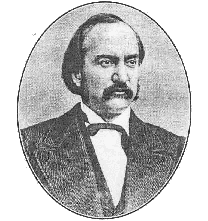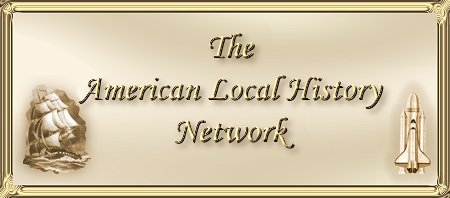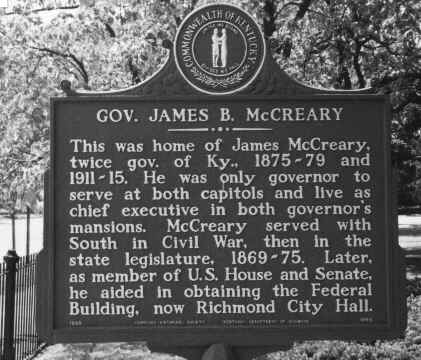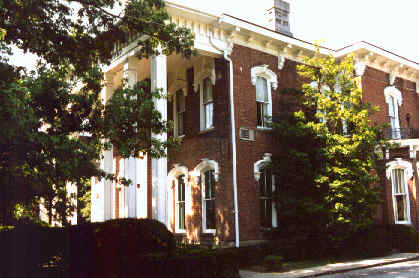Governor James Bennett McCreary,
"A Forgotten Son of Old Kentucky"
By Scott K. Williams, a McCreary kinsman.
(1838-1918)
- Twice Governor, Soldier, Statesman, and Patriot
Life Sketch (includes McCreary's wartime diary account)
The Gallant McCreary (An account by Bennett Young, CIC United Confederate Veterans)
As a "Human Shield" ("Immortal 600")
Morgan's Men Association Articles (Includes One About McCreary's Speaking to CS Congress on behalf of black soldiers)
 |
Roadside marker in front of McCreary's homeplace, Richmond, Kentucky
(Click on image to see larger image)
Life Sketch
James Bennett McCreary was born July 8, 1838 to Dr. Edmund R. McCreary (son of James McCreery and Mary Barr) and Sabina Bennett (daughter of Moses Bennett and Rebecca Davis) in Richmond, Madison Co., KY.
His paternal grandfather, James McCreery (b. 6 June 1775/6; d. 16 Jan 1833), was a son of Capt. Robert McCreery (Rev. War veteran) and Polly McClanahan. Paternal grandmother, Mary Barr, daughter of Thomas Barr, Jr. and Mary Toland Barclay. James had served in the War of 1812 and is buried at Walnut Hill Presbyterian Church, 4 miles SE of Lexington, Ky. [Note: Robert and Polly McCreery was also the direct ancestor of webpage author Scott K. Williams.]
Also born to Dr. Edmund and Sabina McCreary was one daughter, Mattie Vorilis McCreary, on 20 Jan 1834. Mattie married Thomas C. Bronston (son of Thomas S. Bronston and Lucy Clark), also of Richmond, KY.
"Fall in boys, the South needs you."--Miss Mary Virginia Jackson |
James B. McCreary was educated at Centre College in Danville, McCreary received a A.B. degree in 1857. Following this he went to study law at Cumberland University at Lebanan, Tennessee, where he graduated valedictorian of his class in 1859. During this stay at Lebanan, McCreary became ill with typhoid fever, "suspended between life and death for weeks". After returning to Richmond, McCreary opened up his law practice, but all that was cut short by the sounds of war. During the Battle of Richmond, McCreary shouldered a rifle with the rank of private and saw his first engagement. On Aug 31, 1862 McCreary was appointed the rank of Major of the 7th kentucky Cavalry (later made the 11th KY Cav), "Chenault's Cavalry". Maj. McCreary helped recruit many men of the area. At one barbecue at the Jackson residence of Clark County, McCreary spoke from a balcony while the beautiful Miss Mary Virginia Jackson waved the Confederate flag and shouted, "Fall in boys, the South needs you". McCreary never was far from the beautiful ladies of the South had the highest compliments for their contribution.
Even though members of McCreary's family had joined the armies of both the North and South, McCreary was "Arrayed in war against relatives, one of whom has a lovely noble daughter, my cousin, visiting us now, under the same roof with me and I stand in battle...against her father. My parents are opposed to my going into the army and opposed to my politics. God knows I love them dearly...but I cannot stay in peace and I believe it my solemn duty to assist in hurling back oppression and ruin from people of whom I am a part." McCreary also wrote, "We of the South,...are compelled to take arms in defense of our rights, our liberties, our homes, and our property...I can not stay in peace and I believe it my solemn duty to assist in hurling back oppression and ruin from people of whom I am a part." McCreary was accompanied by his bond servant, Reuben, throughout the war. Reuben was eventually captured in battle at Buffington Island, Ohio, only hours before McCreary surrendered his command at Cheshire.
"We of the South...are compelled to take arms in defense of our rights, our liberties, our homes, and our property...I can not stay in peace..."--James B. McCreary |
On Feb 15, 1863, McCreary led his men in a heated gun battle against Wolford's 1st Kentucky Cavalry, USA. Col Wolford was scheduled to speak in Burkesville, Ky, denouncing Lincoln's slavery policy. From a house in Burkesville, McCreary's men were well protected behind it's walls and for this the boys of the 11th Kentucky named it, "Ft. McCreary". It was here that they broke up the scheduled speaking and killed/wounded many "yankees".
At the beginning of Morgan's Indiana/Ohio raid (July 4th, 1863), the 11th Ky Cavalry was ordered to open the battle on the Green River stockade. The assault made it through the outer works and abatis but could go no further against the impregnable fortress. Col. Chenault, Capt. Chenault, Capt. Tribble, Lt. Tribble and Lt. Baldwin were killed, plus fourteen privates killed/wounded. "It was a sad, sorrowful day, and more tears of grief rolled over my weather-beaten cheeks on this mournful occasion...", recorded McCreary. (For more on this see Bennett Young's speech in table of contents at top of this page)
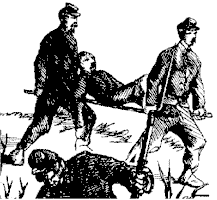
During the Indiana-Ohio raid, McCreary described the near constant sniping on the long gray column, as "the music of the enemy's balls is now as familiar and common as the carol of the spring bird which, unknowing of death and carnage around, sings today the same song that gladdened our forefathers." The only rest they would receive was when they laid down at night with their bridles in their hands. Finally on July 18th, the horde of Yankee cavalry caught up with the raiders at Buffington Island, Ohio. Here McCreary describes that the Yankee "transports landed their infantry, and thousands of cavalry moved down upon us ... Shells and minnie balls ricocheting and exploding in every direction, cavalry were charging, and infantry with its slow, measured tread moved upon us, while broadside after broadside was poured upon our doomed command from the gunboats..." McCreary escaped, with half his command, by leading a charge through the enemy line and rejoining with rest of Gen. Morgan's remnant command.
"...broadside after broadside was poured upon our doomed command ..."--James B. McCreary |
On July 20th, McCreary's men, exhausted of ammunition, were surrounded on a high hill near Cheshire, Ohio. Under fire from gunboats, McCreary and all the officers elected to surrender their command of seven hundred to Gen. Shackelford (USA). Gen. Morgan was able to escape with a remnant, only to be later captured near the Pennsylvania State line. McCreary and the rest of the Officers were sent to the Ohio Penitentiary in Columbus. Assigned to cell 30, range one, McCreary described a stay in the prison dungeon as a "... living death, this Hell on earth, I endured for nearly five days, starving, walking day and night, and all the time nauseated by the terrible stench of a night bucket...When I was taken out I was scarcely able to stand up, and some of my comrades had to be helped to their cells, with their feet swollen and blood oozing out under their fingernails and toe nails." (For more on McCreary's prison life and military experience see "As an Immortal 600" in table of contents of this web page).
McCREERY HOME, RICHMOND, MADISON COUNTY, KENTUCKY
(Click on picture to see larger image.)
-
James B. McCreary, started off in 1868 as a delegate to the Democratic National Convention. During this event he represented Frank Blair, a former Union general we all know (Blair, after the war, sided with the South in regard to fighting unConstitutional Republican corruption.). After several years in the Kentucky House (1869-1875), James B. McCreary, was elected Governor in 1875. He campaign focused on the abuses of the Grant Reconstruction politics and defeated ex- Union general John M. Harlan. The McCreary administration was one of the most popular the state of Kentucky ever had. It had helped bring peace to a State once divided by war and McCreary put an end to the atrocities being committed by mountain feuds that ravaged eastern counties of the State. He also established an Agricultural college, Dept. of Agriculture, State Health board, and a "normal school". From 1885-1897 McCreary served in the U.S. House of Representatives, and 1903-1909 in the U.S. Senate. In 1911 McCreary was elected a second term as Kentucky Governor. During this term he made women eligible to vote, compulsory school education, longer school term, repealed the uniform textbook law (allow districts to choose textbooks), ensured counties to have the right of the liquor option (regarding prohibition) and Departments of banking, roads, fish, game, and forestry. McCreary attempted but failed to pass a workman's compensation act, campaign reform, and direct primaries. Gov. McCreary was described as "just, conscientious, conservative, yet liberal, far sighted, blessed with an iron-will, yet his nature was as sunny and unsoured as that of a sweet-hearted girl !"
Besides being a member of the United Confederate Veterans (UCV), McCreary was active in the Morgan' s Men Association, a fraternal organization of men who rode with Gen. John Hunt Morgan. In 1909, when Senator James B. McCreary was leaving office, he was complimented by fellow Congressmen who said, "Senator McCreary, we salute you, sir, and by your leave we say: 'Well done, you've kept the faith, you've kept Kentucky's honor bright. Thanks old Roman, for the example set for ourselves and our sons."
Following his last term as Governor, McCreary returned to Richmond, where he continued his law practice until his death, 8 Oct, 1918.
Of his career, McCreary himself stated, "I thank God that I lived long enough to vote in the Senate of the United States to return the captured Confederate flags to the regiments and companies who loved them and fought under them, and that I also voted to appropriate money and authorize the appointment of a Confederate officer to collect the remains of Confederate soldiers buried in Northern graves and to mark their final resting places with appropriate headstones. But the great and crowning act which I will never forget was that I had the honor to help place the statue of Robert E. Lee, the greatest general of the Civil War, in Statuary Hall, in the Capitol at Washington, with the statues of others of the most distinguished sons of the Republic, and by the side of George Washington, our First President.
McCreary County, Ky in the Southeastern part of the State was named in honor of Gov. McCreary.
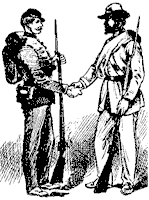
50th Anniversary Battle of Gettysburg Speech
In 1913, McCreary attended the 50th Anniversary of the Battle of Gettysburg. There he spoke to the veterans of both armies and stated, " Here Union and Confederate soldiers by their bravery, self-sacrifice, and endurance won the admiration of the world. Here great lessons were taught... one that the Union must be preserved; another that the States have rights which must be maintained; and, in the words of Abraham Lincoln at Gettysburg, 'That the nation shall under God have a new birth of freedom and that the government of the people, by the people, and for the people shall not perish from the earth.' "
"...There are no more patriotic people than Confederate veterans. Reconciliation and patriotism were both shown when the tocsin of war was sounded at the beginning of the Spanish-American war and former Confederate soldiers an sons of Confederate soldiers enlisted and helped to carry the Stars and Stripes to victory..."
Sources:
Dictionary of American Biography, by Dumas Malone; Charles Scribner's Sons: New York; vol. 12
The Kentucky Encyclopedia, by John E. Kleber
Confederate Military History
The Confederate Veteran; United Confederate Veteran
Kentucky's Governors, edited by Lowell H. Harrison; University Press of Kentucky.
Old Cane Springs, A Story of the War Between the States in Madison County, Kentucky; by Dr. Jonathon Truman Dorris and John Cabell Chenault; The Standard Printing Co., Louisville, Ky 1936
The Journal of My Soldier Life; By James Bennett McCreary; Register, vol. 33 No. 103; April 1935; Kentucky State Historical Society.
Have More Information about Gov. James Bennett McCreary ? Please write, Scott K. Williams at email: Showmemule "at" earthlink.net (replace "at" with @ and delete spaces).
-
[11th Kentucky Cavalry main page] [Return to Officer's Page] [Guestbook Entries]
Please visit my home website, www.stlouistimeportal.com
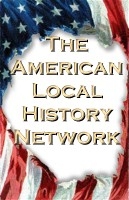
Kentucky ALHN Website http://www.usgennet.org/usa/ky/state1/
Adopt a Kentucky County: http://www.usgennet.org/usa/ky/state1/counties.html
Copyright 1997. Copying is permitted for noncomercial or educational use by individuals, scholars and libraries. This message must appear on all copied material. Any other use, including electronic reproductions or distribution, requires written permission of the author, Scott Williams. Email: Showmemule "at" earthlink.net (replace "at" with @ and delete spaces).
Background music, "My Old Kentucky Home", Copyrighted by ReWEP Associates, 1997. Used with permission only. Special thanks to Larry Bowman, member of Kentucky Division, S.C.V., for the photos of McCreary's home site
